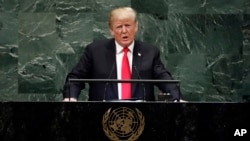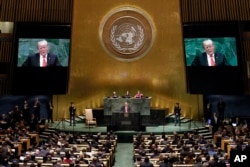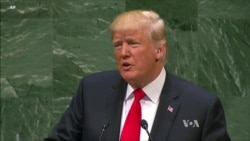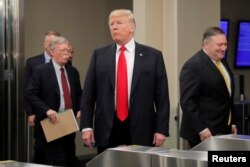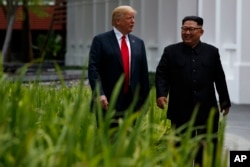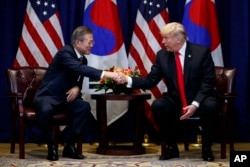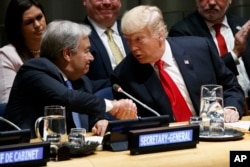U.S. President Donald Trump has called on world leaders gathered at the U.N. General Assembly to "isolate Iran's regime as long as its aggression continues," accusing Iranian leaders of sowing "chaos, death and destruction."
"They do not respect their neighbors or their borders or the sovereign rights of nations. Instead, Iran's leaders plunder the nation's resources to enrich themselves and to spread mayhem across the Middle East and far beyond," Trump said a speech to the General Assembly Tuesday.
Trump maintained that the Obama-era 2015 nuclear deal to end Iran's nuclear weapons program, which he withdrew from, was a "windfall for Iran's leaders" and boosted its military budget by nearly 40-percent to "finance terrorism and fund havoc and slaughter in Syria and Yemen."
The president said his administration started last month "reimposing hard-hitting nuclear sanctions that have been lifted under the Iran deal" and that more sanctions would be imposed on November 5 and beyond.
"We cannot allow the world's leading sponsor of terrorism to possess the planet's most dangerous weapons. We cannot allow a regime that chants death to America and that threatens Israel with annihilation," Trump said.
Later, speaking to reporters while he sat alongside Colombian President Ivan Duque, Trump said: “I hope we can have the same trajectory” with Iran as the U.S. has had with North Korea.
"It was me who said no, not them,” on meeting with Iranian officials during the U.N. meeting. Trump added said such talks cannot occur until Tehran changes its behavior.
"Otherwise they’re going to be in the worst trouble of any country anywhere in the world,” said the U.S. president.
His national security advisor, John Bolton, issued an even tougher warning to Tehran in a New York speech Tuesday to U.S. advocacy group United Against a Nuclear Iran.
WATCH: Trump UNGA speech
“If you cross us, our allies or our partners, if you harm our citizens, if you continue to lie, cheat and deceive — yes, there will indeed be hell to pay,” he said.
Iranian President Hassan Rouhani told the assembly that no country can be brought to the negotiating table by force. Rouhani also questioned how Iran can enter into an agreement with the U.S., which he said violates the policies of his predecessor, Barack Obama. In addition, Rouhani accused the Trump administration of trying to render all global institutions ineffectual.
Earlier Tuesday, Trump said on Twitter he rejected multiple requests to meet with Rouhani, an assertion Rouhani firmly denied.
"Not this year, nor last year," he said in a CNN interview. "We have never made such as request for a meeting with the President of the United States."
Earlier this year, Trump announced the U.S. was withdrawing from the Iran nuclear deal. In November, companies doing business with Iran will have to stop or risk being shut out of the U.S. financial system. Washington wants to pressure Tehran back to the negotiating table for a new, broader deal.
Experts have warned Trump's approach toward Iran may find the U.S. somewhat isolated at the U.N. General Assembly.
“The problem for the Trump administration is that many of the U.S.’s allies, including the powers which are signatories to the Iran nuclear deal, they will not join such condemnation,” noted the Middle East Institute’s Ahmad Majidyar. “While these countries share Washington’s concerns about Iran’s controversial ballistic missile program or support for some terrorist and militant groups in the region, they strongly support the nuclear deal and they do not back Washington’s unilateral exit.”
North Korea
Trump also touted his relationship with North Korea, saying it has helped ease tensions on the Korean peninsula.
"The missiles and rockets are no longer flying in every direction, nuclear testing has stopped, some military facilities are already being dismantled," Trump said.
Trump added that "much work remains to be done" with North Korea and said "The sanctions will stay in place until denuclearization occurs."
His comments about North Korea were in sharp contrast from those he delivered at the assembly last year, when he threatened to "totally destroy" the country and ridiculed North Korean leader Kim Jong Un as "Rocket Man" who was on a "suicide mission."
The two leaders met in Singapore in June and the White House is working on scheduling a second summit. Despite Trump's praise of Pyongyang, the Trump administration has said Pyongyang is stalling in meeting the goals set in Singapore.
South Korea’s president personally relayed a message on Monday to Trump, telling him that North Korea’s leader wants to meet him again soon to make progress on denuclearization of the Korean Peninsula.
“You are indeed the only person who can solve this problem,” Moon Jae-in, who met Kim Jong Un last week in Pyongyang, told Trump.
The U.S. president responded that he would be “having a second summit with Chairman Kim in the not-to-distant future” and the location remains to be determined but likely would not be Singapore, where he first met the North Korean leader on June 12.
“The relationship is very good – in fact in some ways it is extraordinary,” added Trump.
In addition to criticizing Iran, Trump also denounced China for what he maintains are the country's unfair trade practices. The president did not mention Russia's meddling in the 2016 U.S. presidential election or its interference in Syria.
Multilateralism in peril?
In the year since he made his U.N. debut, Trump has cut funding to the world organization, withdrawn from the Paris Climate Agreement and the Iran nuclear deal, and quit U.N. bodies, including the Human Rights Council. He has also had difficult outings at gatherings of G-7 leaders and NATO.
“I think that a lot of leaders are going to be pretty cautious with President Trump,” said Richard Gowan, senior fellow at the U.N. University Center for Policy Research. “The Europeans have been quite burned at a number of recent summits.”
Without naming names, U.N. Secretary-General Antonio Guterres recently told reporters that “multilateralism is under attack from many different directions precisely when we need it most.” He said he would use his meetings to press for a renewed commitment to a “rules-based global order and to the United Nations.”
VOA U.N. correspondent Margaret Besheer and Wayne Lee contributed to this report.




